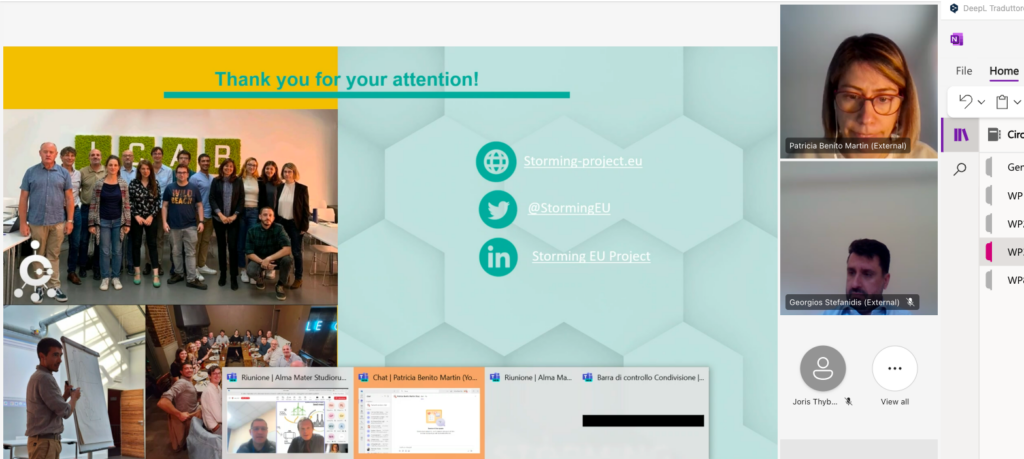17 January 2024 – Five Horizon Europe projects organised a joint online workshop: The Electric Decade.
The main objective of the event was to present how to scale up various innovative electrification technologies for the chemical industry to ensure reaching the EU’s climate goals. The event was organised by the e-CODUCT* project, co-organised by EReTech*, ēQATOR*, TITAN and STORMING. Two experts, Franz Hörzenberger (ArcelorMittal) and Walter Vermeiren (Total Energies), gave introductory insights into electrification. This was followed by presentations of the projects, a round table discussion and Q&A from the attendees.
Franz Hörzenberger, Head of EU Affairs at ArcelorMittal Global R&D, Co-Chair of the Clean Steel Partnership (CSP) and A.SPIRE Vice-Chair for Climate and Energy, focussed on the question of how electrification can contribute to achieving the circularity goals. Electrification is a factor that is taken into account when analysing the projected increase in electricity demand in industry and the impact of meeting this demand through renewable sources. Electrification can generally help achieving circular economy goals by reducing the use of non-renewable resources and greenhouse gas emissions. He presented the study by A.SPIRE (Processes4Planet Research Association) on a quantitative assessment of the energy situation in the EU, focussing on the projected increase in electricity demand in industry by 2030 and the current and projected supply of renewable electricity that could meet this demand. The study analyses the increase in direct electrification compared to other approaches, such as the use of hydrogen, for industrial processes. The assessments indicate that by 2030 there is a significant risk that the supply of renewable energy to the process industry will be insufficient. To counter this problem, measures such as the development of efficient electrification of industrial processes and research into alternative methods are required. More information >>>
Walter Vermeiren, Head of Technology and Scientific Intelligence at TotalEnergies, Chairman of the “Cracker of the Future” consortium and key member of GDR Tamarys, highlighted in his presentation various electrification technologies as options for decarbonisation and presented their potential use for the electrification of industrial heat, especially in complex refineries. The spectrum of electrification technologies is broad: electric heating (Joule effect, microwave and induction), electric process heaters, mechanical vapour recompression, electric driver pumps, backpressure turbines and electrolysers. The “Cracker of the Future” consortium initiative is investigating the direct electrification of furnaces, considering technologies such as radiation on coils, RF waves, microwaves, resistance heating, induction heating, fluidised bed and arc plasma. More information >>>
This was followed by a presentation of the projects involved. Dr. Gleb Veryasov, head of the R&D team at TotalEnergies, presented the e-CODUCT project, which addresses the problem of the incomplete value chain and the lack of technologies to ensure circularity of CO2 in industrial processes. The consortium is developing a novel technology for the valorisation of carbon dioxide with simultaneous sulphur recovery from H2S to reduce the greenhouse gases and acid gases produced by industry. The e-CODUCT technology is based on an electrified process to convert acid gas into CO, sulphur and water, the former being a platform molecule for further conversion into sustainable aviation fuel (SAF), methanol, benzene-toluene-xylene mixtures (BTX), etc.. More information >>>
Dr. Gianluca Pauletto, CEO of SYPOX GmbH and leader of the EReTech consortium, presented the innovative approach of the EReTech project, which applies electrified reactor technology for hydrogen production. EReTech uses a ceramic supported structured catalyst that are heated by internal direct resistive elements and operates at high temperatures of up to ~1200°C and ~25 MW/m3. This approach aims to maximise emission reduction and increase the stability and performance of the catalyst. More information >>>
The ēQATOR project was presented by Dr. Richard Heyn, Head of Research at SINTEF Industry. The project focuses on the development of electrically heated catalytic reforming reactors for the use of biogas to produce chemicals, particularly methanol, which will defossilise chemicals production through a cost-competitive route with near zero CO2 emissions. The eQATOR technology will promote the development of the local methanol economies. More information >>>
Dr. David Farrusseng, research director at IRCELYON and co-leader of the ENG team, presented the TITAN project. The TITAN consortium will develop an innovative microwave-heated catalytic reactor that converts biogas directly into H2 without emitting greenhouse gases. It aims to achieve a high H2 yield at a competitive cost, thanks to low CAPEX, global process efficiency and affordable solutions for the European biogas industry. The co-produced carbon material can be used for soil amendment nearby delocalised biogas plants, enabling long-term carbon sequestration and a sustainable circular economy. More information >>>
The STORMING project was presented by Prof. Dr. Patricia Benito from the University of Bologna. STORMING will develop ground-breaking and innovative structured reactors. These reactors, powered by renewable electricity, will convert both fossil and renewable CH4 into CO2-free H2 and highly valuable carbon nanomaterials for battery applications.
The presentations were followed by a round table moderated by Prof. Georgios Stefanidis and a Q&A session. More information >>>
The moderator of the event was Prof. Joris W. Thybaut from Ghent University. The Electric Decade workshop was attended by 130 participants from various sectors. A follow-up event is envisaged near the end of the projects (late 2025/early 2026) to present the projects results under the form of developed electrification technologies as solutions to reduce emissions, integrate renewable energy, enhance energy efficiency, promote circular economy principles, foster innovation, and drive the transformation of industries towards a more sustainable future.

*e-CODUCT, EReTech and ēQATOR are sister projects under HORIZON-CL4-2021-RESILIENCE-01.
